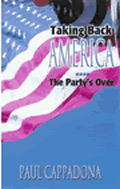Other
Eakman
Articles:
So, You Want to be an "Education" Candidate
The Resignation of a Schoolteacher
THE CELEBRITY "ANTIDEPRESSANT WARS"
By
Beverly Eakman
August 3, 2005
NewsWithViews.com
�Smear over substance� is, once again, the order of the day in an important controversy. I�m talking about the brouhaha surrounding actor Tom Cruise and his Hollywood colleague, Brooke Shields, regarding their respective views on antidepressant drugs. Inevitably, psychotherapies in general became intertwined with the topic of mind-altering substances -- and so did Scientology, the b�te noire of the psychiatric profession.
First, to clarify matters: I am a conservative Episcopalian (no, that is not an oxymoron, quite yet), not a Scientologist. Until Scientology�s spin-off organization, the Citizens Commission on Human Rights, contacted me in 1996 concerning two of my books on education, I had only heard of it in passing and had never heard of CCHR. Long ago and quite independently, I had come to certain conclusions, the primary one being that psychology had compromised the educating process. That was why I left the teaching profession. The new emphasis on emotions meant that academics took a back seat. It inaugurated what I felt was a phony and counterproductive self-esteem movement. Finally, psychologized education brought in a counseling industry that undermined the moral authority of adults, with the consequence that teachers were handling little �mob-ocracies� instead of kiddy cliques.
Nevertheless, I did what was expected during those heady days of the �value neutral� educator of the 1970s. And I was darn good at it, too. I once found out that my class had started up a gambling pool to ascertain my political and religious persuasions.
Turned out, about 40 percent said Democrat and 40 percent said Republican, with the rest going to �Other.� My students were all over the map about religion. The principal loved it, and we both had a good laugh. Of course, nobody ever won the pool, because I never did set the kids straight.
But with the arrival of the counselor-therapist, I got the sinking feeling that psychology in schools was �morphing� into something more ominous: psychotherapy and drugs were replacing the discipline and character-building functions that had been the staples of education and childrearing.
Eventually, I left teaching for fairer fields as a technical and science writer. Later, I became a speech writer for the heads of several high-profile agencies. I was sick of the whole school scene, and yet�
By the time reports started appearing, in the late 1980s, alleging that schools were intimidating parents into putting their children on psychiatric drugs, I knew my suspicions had been right. That�s when I started checking things out, and I was flabbergasted.
Not only was real, scientific research on learning methods being scuttled, but I couldn�t find any hard, statistical validity behind the claims for psychiatric drugs that were being prescribed for behavioral problems. Eventually, renowned experts in government and on the boards of major pharmaceutical companies were blowing the whistle on unreported side-effects, unsubstantiated claims, and outright fraud -- and they weren�t Scientologists. Experts and authors like Drs. Peter Breggin, David Healy, Charles Medawar, and (more recently) former Pennsylvania Inspector General Allen Jones were, in many cases, actually hostile toward Scientology.
Today, reports that many antidepressants have no more effect than a placebo are ubiquitous. Which brings up the question: Is the aggressive marketing of psychotropic drugs creating a market based on the power of suggestion?
That is the crux of the argument between Tom Cruise and Brooke Shields. If Ms. Shields believes she had a real disease after the birth of her child as opposed to feeling unsettled in her new role of �mother� over �actress� -- no doubt an enormous change of pace -- well, it is her privilege. But that antidepressant she thinks brought her out of the doldrums may be a time bomb in her system, robbing her first of sexual enjoyment, then impulse control, and a whole bunch of other side-effects she may not have noticed yet.
Should she experience additional �symptoms,� she will no doubt be offered another drug, on top of the one she might still be taking, and then another, and another, until she winds up like Houston murderess Andrea Yates: totally delusional -- this time, perhaps, with a bona fide disease that is both verifiable and permanent.
Like many people, I take most of what Hollywood stars say with a grain of salt, and Tom Cruise�s June 24th interview on NBC�s �Today Show� may not have been the most articulate discussion about drugs or that whole field technically known as �behavioral science.� Mr. Cruise was particularly blasted for suggesting that vitamins and exercise could serve as solutions for emotional and mental problems.
But we must remember that such interviews revolve around sound bites. That�s all television journalists really want: short sentences that explain little but are easily merged into a 7-minute topic segment that TV executives believe will keep viewers keep from changing channels. Hollywood�s stars know whatever they say must be condensed down to a sentence.
Experts increasingly are learning how to do that, too. For example, in testifying on a proposed bill before the Florida legislature, one legislator erroneously lumped narcolepsy with �conduct disorder� in an attempt to illustrate that many so-called psychiatric �diseases� are not diseases at all, but rather, subjective phenomena.
Nobody else caught it, but I winced, because I knew that narcolepsy was a real illness, provable via medical tests, whereas �conduct disorder� is not. The legislator probably knew it, too, but that�s what happens when hammering home a point and maintaining eye contact supersedes reference to notes.
The fact is, there is nothing in the medical, scientific literature that confirms objective abnormality (�objective abnormality� equates to disease) in Attention-Deficit/Hyperactivity Disorder (ADHD), Conduct Disorder (CD), Oppositional Defiant Disorder (ODD), Post-partum Depression, �math disorder� or hundreds of other �diseases� that psychiatrists swear up and down are �biological.� If they were biological, scientists would be able to see evidence in blood workups, x-rays, urinalyses, taps of spinal fluid, or something. But they can�t. No one knows, for example, how much serotonin (the chemical associated with depression) is normal, or how much is too much or not enough. But medical doctors can tell for sure if you have a vitamin deficiency, and they can tell you which vitamin, too. Vitamin deficiencies, allergies and sedentary lifestyles frequently do contribute adversely to mental function.
As much as we would all prefer to jettison unwanted emotions, along with those behaviors we feel compelled to perform, even when they clearly are bad for us; as much as we would like to chalk up our character faults, lack of self-control, impatience and social foibles to bad biology, our chemical makeup and our brains are usually very much intact. Until something is found amiss, no pill in the world is going to fix us up -- except, perhaps, in our dreams.
There are reasons why experts have suddenly found their voice regarding antidepressants and other psychotropic drugs. These can be summed up in the massacres at Littleton (CO), Santee (CA), Paducah (KY), and Red Lake (MN). Every one of the perpetrators was on a psychotropic cocktail that started with an antidepressant.
Today, it�s not uncommon to see youngsters taking anti-depressants like Prozac, stimulants like Ritalin, tranquilizers drugs like Valium, and anti-anxiety drugs like Xanax at different hours of the day. Schools literally disseminate substance-abuse surveys with one hand and dangerous drugs with the other. The effort to turn morality, personality quirks, and now even political incorrectness (like racial bias) into diseases has backfired.
And here�s the thing: Even if you like the political landscape today -- i.e., the boundaries of acceptable opinion and taste -- what is the guarantee that you will like it in 10 years when personality inventories come back to bite you? Forced drugging and therapy can cut both ways.
School psychiatrists have been loath to describe fully the side-effects of the psychotropic substances -- much less predict the statistical chances of a healthy outcome. Well, they can�t predict, actually, because no such statistics exist. Indeed, the track record of psychotherapy has not yet matched its promise.
The Drug Enforcement Administration reported in 1995 that the U.S. consumed some 80 percent of the total world supply of methylphenidate (Ritalin, Concerta, Adderal, etc.), to treat ADD-ADHD -- a drug with enormous potential for abuse because it mimics cocaine-like highs and lows. But psychotropic drugs send a more disturbing message to young people -- that all emotional turmoil throughout their lifetime can be solved by medicating themselves.
By the time youngsters are job-hunting, they frequently find themselves shut out if they were ever prescribed a psychotropic drug -- information now easily accessible by computer. The military, for example, screens out for individuals who have ever taken Ritalin. Why? Psychotropic drugs affect judgment -- and no one knows for how long.
This issue, then, is not liberal-versus-conservative, or even theological, except insofar as we have unwittingly replaced religious ethics with psychiatric dogma.
As for the Scientology, I am not qualified to speak for or against it. However, any philosophy or organization that can channel Hollywood stars away from lives of drugs and therapy must be doing something right, as entertainers are, disproportionately at risk of falling victim to the siren songs of drugs and expensive, long-term psychotherapy. Actors must have, above all else, a thick skin and a high energy level.
Reputations are made and broken mostly on the basis of individual persona -- as well as on their ability to pretend they are somebody else.
Once a superstar, there are the tabloids, the paparazzi, the parties, the shmoozing, the memorizing of lines, which together can take up most of every night. Actors get up while everyone else is asleep for an early morning �shoot,� which ends maybe some 17 hours later.
So, they can�t sleep. And when they finally do, they can�t wake up. They can�t eat, because the camera adds 10 pounds. And they certainly can�t age -- well, at least the women can�t. Public humiliation comes with the territory. Superstars must project the image of perky, happy, hip, and adorable.
Can you imagine a better recipe for depression? Pretty soon, it�s pills to get to sleep, pills to stay awake, pills to be perky, pills for irritability, diet pills, anti-nausea pills for that audition, and maybe steroids, too.
Unless a star�s ego and principles are strong, it would be difficult to imagine a career more destabilizing. Mel Gibson -- a Catholic who owed his life and his marriage to some re-adjusted priorities -- is among those who have negotiated that precarious path, according to his TV interview with Diane Sawyer.
|
Subscribe to the NewsWithViews Daily News Alerts! |
So
maybe we ought to cut Tom Cruise and the Scientologists a little slack.
They may be in the right place after all: Hollywood.
� 2005 Beverly Eakman - All Rights Reserved
Order
Beverly's book, Cloning
of the American Mind is out of print, supply is limited
Beverly Eakman is an Educator, 9 years: 1968-1974, 1979-1981. Specialties: English and Literature.
Science Editor, Technical Writer and Editor-in-Chief of official newspaper, National Aeronautics and Space Administration, 1974-1979. Technical piece, "David, the Bubble Baby," picked up by popular press and turned into a movie starring John Travolta.
Chief speech writer, National Council for Better Education, 1984-1986; for the late Chief Justice Warren E. Burger, Commission on the Bicentennial of the US Constitution, 1986-1987; for the Voice of America Director, 1987-1989; and for U.S. Department of Justice, Gerald R. Regier, 1991-1993.
Author: 3 books on education and data-trafficking
since 1991, including the internationally acclaimed Cloning
of the American Mind: Eradicating Morality Through Education. Executive
Director, National Education Consortium. Website: BeverlyE.com
E-Mail: deakman@erols.com
So maybe we ought to cut Tom Cruise and the Scientologists a little slack. They may be in the right place after all: Hollywood.













